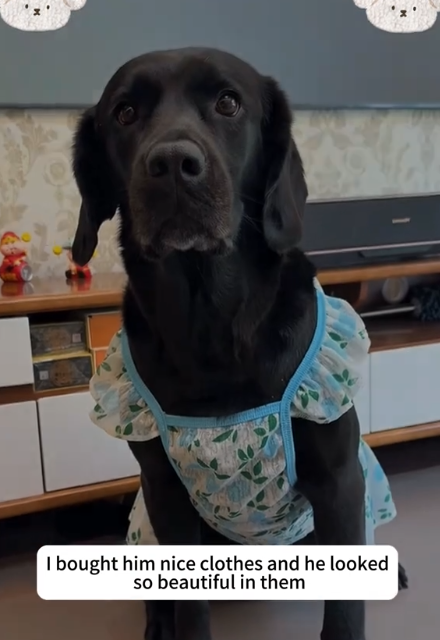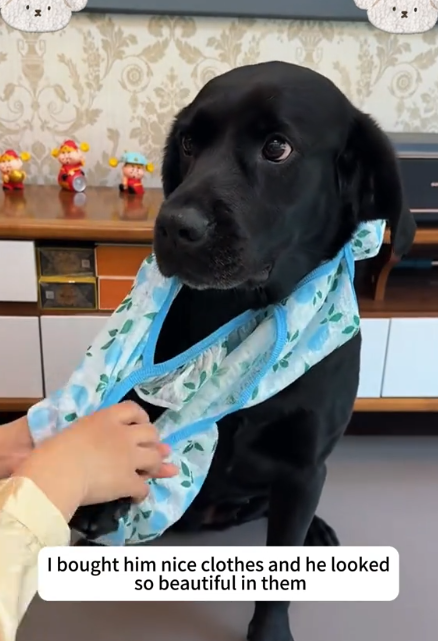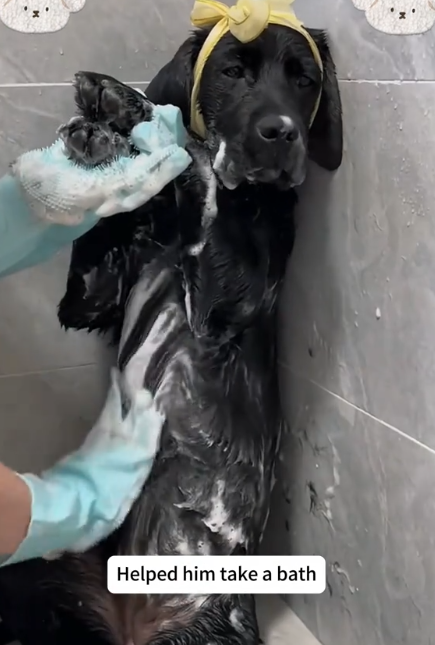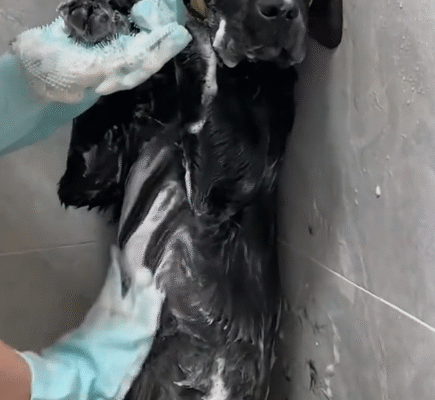
It had rained nonstop for days. The sky remained dark and heavy, and the river that ran through our small town had started to rise, inch by inch, turning calm streets into swirling currents. Everyone was on edge—packing essentials, moving furniture to higher ground, helping neighbors—but nothing could have prepared us for the chaos that came when the floodwaters surged without warning.
Amidst the panic and rushing water, sirens wailed in the distance, and boats moved along what were once roads. In all this confusion, no one noticed the tiny brown dog clinging to a piece of broken fence near the old community park. That is, until I did.
I was on my way to check on my grandmother’s house, which sat on slightly higher ground. With my raincoat zipped tightly and boots sloshing through knee-deep water, I crossed an alley shortcut I knew well. That’s when I heard the barking—short, panicked yelps, the kind that came from pure fear.
I paused. The sound was faint but desperate.
I squinted toward the source. A little dog, soaked and trembling, was stuck on a half-submerged fence post. The current tugged at it fiercely, and it looked like any moment the fence would collapse completely. My heart jumped. That dog didn’t have much time.
I waded forward cautiously, the floodwater pressing against my legs, slowing every movement. “It’s okay, buddy,” I called out softly. “Hang on!”
The dog barked again, louder this time, as if responding to my voice with hope. I could see it more clearly now—small, scruffy, probably a stray. Its eyes were wide, its front paws braced against the wood, trying to stay above water.
I didn’t have any proper rescue gear—no rope, no boat. Just me, a backpack, and determination. I stepped onto a submerged curb and carefully edged toward the fence, checking the water depth with each step. The current was strong. One wrong move, and I could be swept away too.
About five feet away, I stopped. “Okay, little one, I’m going to help you. Just stay still.”
I took off my backpack and pulled out an old towel I always carried. With that, I made a makeshift sling. It wasn’t much, but maybe it would help me carry the dog safely if I could get close enough.

Carefully, I moved forward. The fence creaked under the pressure of the water. The dog flinched as I approached, unsure whether to trust me or flee.
“It’s alright,” I whispered, reaching out a hand. “I’m here to help.”
After a few agonizing seconds, the dog sniffed my hand. It was shivering violently but didn’t try to bite or escape. I gently looped the towel under its belly and lifted it into my arms. It was so light—skin and bones, really. But the way it clung to me as I turned back made me feel like I was carrying something priceless.
Step by step, I made my way back through the flood. The current was stronger now, almost waist-high, and my boots filled with water. I struggled to keep balance, gripping the dog tightly to my chest. At one point, I nearly fell when my foot slipped on loose gravel, but I held on, gritting my teeth and pushing forward.
By the time I reached dry ground, my legs were trembling. I sat down on a concrete bench—half-flooded, but stable—and laid the dog on my lap. It looked up at me with the most grateful eyes I’d ever seen. I wrapped it tightly in the towel, trying to stop its shivering.
A man in a rescue boat spotted us and pulled over. “You alright?” he asked.
I nodded, still catching my breath. “Found him stuck on a fence over there.”
“Good on you,” he said, tossing me a foil emergency blanket. “We’re taking people to the shelter down at the school gym. Hop on.”
I climbed into the boat with the dog cradled in my arms. As we sped down the street-turned-river, I looked down at the pup, who had finally closed his eyes, breathing slow and steady.
At the shelter, volunteers welcomed us in and gave the dog some food and warm blankets. A vet, who had been helping other rescued animals, came over and examined him. “He’s lucky you found him,” she said. “Dehydrated, exhausted, but he’ll be okay.”
I felt an overwhelming relief. “Does he belong to anyone?”
“No microchip,” she replied. “Might be a stray.”
Over the next few days, I stayed at the shelter, helping where I could—distributing supplies, comforting kids, and assisting with lost pets. And that little dog? He never left my side. Wherever I went, he followed, tail wagging shyly, clearly bonding with me in his quiet, grateful way.

I named him Lucky.
When the floodwaters finally began to recede and we could return home, I brought Lucky with me. I made him a bed by the window, got him checked again at the vet, and started giving him regular meals and warm baths. In return, he gave me loyalty beyond words.
Lucky became a reminder for me—of the storm, yes, but also of the power of compassion. In the darkest moments, something small and fragile can still be worth saving. And sometimes, saving another life saves something inside your own as well.
A month later, our town held a small gathering to celebrate the heroes of the flood—the rescue teams, the volunteers, the neighbors who helped neighbors. I didn’t think of myself as a hero. I just acted on instinct. But when they called my name and mentioned the dog I had rescued, I felt a deep swell of emotion.
Lucky barked once, proudly, beside me on stage. The crowd clapped and laughed.
I knelt beside him and whispered, “We made it, huh?”
And in his eyes, I saw the same grateful glimmer I had seen that first day on the flooded street. Only this time, it was filled with trust, warmth, and the promise of better days ahead.



